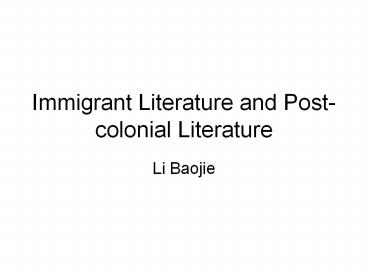Immigrant Literature and Post-colonial Literature - PowerPoint PPT Presentation
Title:
Immigrant Literature and Post-colonial Literature
Description:
Immigrant Literature and Post-colonial Literature Li Baojie Immigrant literature V. S. Naipaul (1932-), Kazuo Ishiguro (1954-) and Salman Rushdie (1947-), Nobel Prize ... – PowerPoint PPT presentation
Number of Views:450
Avg rating:3.0/5.0
Title: Immigrant Literature and Post-colonial Literature
1
Immigrant Literature and Post-colonial Literature
- Li Baojie
2
Immigrant literature
- V. S. Naipaul (1932-), Kazuo Ishiguro (1954-) and
Salman Rushdie (1947-),
3
Sir Vidiadhar Surajprasad Naipaul
4
Nobel Prize Laureate
- Sir V. S. Naipaul receiving his Nobel Prize from
His Majesty King Carl XVI Gustaf of Sweden at the
Stockholm Concert Hall, 10 December 2001.
5
- The Swedish Academy, in awarding Naipaul the
prize, praises his works"for having united
perceptive narrative and incorruptible scrutiny
in works that compel us to see the presence of
suppressed histories." - The Committee added, "Naipaul is a modern
philosophe carrying on the tradition that started
originally with Lettres persanes and Candide. In
a vigilant style, which has been deservedly
admired, he transforms rage into precision and
allows events to speak with their own inherent
irony."
6
- The Committee also notes Naipaul's affinity with
the Polish author of Heart of Darkness, Joseph
Conrad - Naipaul is Conrad's heir as the annalist of the
destinies of empires in the moral sense what
they do to human beings. His authority as a
narrator is grounded in the memory of what others
have forgotten, the history of the vanquished.
7
Biography
- Born in Trinidad in 1932, the descendant of
indentured labourers shipped from India, this
dispossessed child of the Raj has come on a long
and marvellous journey. His upbringing
familiarised him with every sort of deprivation,
material and cultural. A scholarship to Oxford
brought him to England.
8
Nobel Lecture
- Sir V. S. Naipaul delivers his Nobel Lecture in
Börssalen at the Swedish Academy in Stockholm, 7
December 2001.
9
Two Worlds
- So as a child I had this sense of two worlds, the
world outside that tall corrugated-iron gate, and
the world at home - or, at any rate, the world of
my grandmother's house. It was a remnant of our
caste sense, the thing that excluded and shut
out. In Trinidad, where as new arrivals we were a
disadvantaged community, that excluding idea was
a kind of protection it enabled us for the
time being, and only for the time being to live
in our own way and according to our own rules, to
live in our own fading India. It made for an
extraordinary self-centredness. We looked
inwards we lived out our days the world outside
existed in a kind of darkness we inquired about
nothing.
10
- But the habits of mind engendered by this shut-in
and shutting-out life lingered for quite a while. - Those stories gave me more than knowledge. They
gave me a kind of solidity. They gave me
something to stand on in the world. I cannot
imagine what my mental picture would have been
without those stories.
11
- His fiction and especially his travel writing
have been criticised for their allegedly
unsympathetic portrayal of the Third World. - Naipaul's writings dealt with the cultural
confusion of the Third World and the problem of
an outsider, a feature of his own experience as
an Indian in the West Indies, a West Indian in
England, and a nomadic intellectual in a
postcolonial world.
12
- The comic spirit is still present, though
submerged in his later books beneath a darkening
sense of tragedy. Naipaul has written about
slavery, revolution, guerrillas, corrupt
politicians, the poor and the oppressed,
interpreting the rages so deeply rooted in our
societies.
13
Bend in the River (1979)
- Footloose, he began to travel for long periods in
India and Africa. It was at a time of
decolonisation, when so many people the whole
world over had to reassess their identity.
Naipaul saw for himself the resulting turmoil of
emotions, that collision of self-serving myth and
guilt which make up today's bewildered world and
prevents people from coming to terms with who
they really are, and to know how to treat one
another. On these travels he was exploring
nothing less than the meaning of culture and
history (David Pryce-Jones, Naipaul is Truly a
Nobel Man in a Free State).
14
References
- Pryce-Jones, David. Naipaul is Truly a Nobel Man
in a Free State. http//nobelprize.org/nobel_priz
es/literature/laureates/2001/naipaul-bio.html































